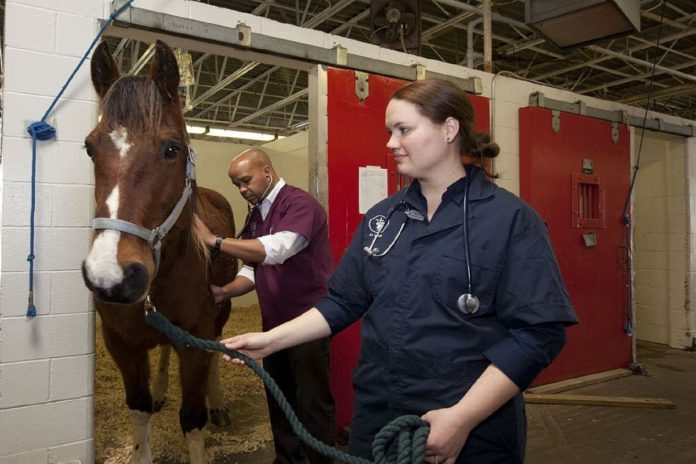Veterinary Ireland has set a key objective to work towards improving the work-life balance of vets in Ireland over the next five years.
That is what its members heard at the organisation’s AGM and conference at the Knightsbrook Hotel in Trim, Co. Meath, on November 26th, 2021.
A survey of the veterinary profession in Ireland identified major concerns in relation to working conditions.
Veterinary Ireland’s Benchmark Survey 2020 found that these concerns could undermine the long-term sustainability of veterinary and out-of-hours services, particularly in rural parts of the country.
Finbarr Murphy, Chief Executive of Veterinary Ireland, says:
“The Veterinary Ireland survey provides an extraordinary amount of data on work and life as a veterinary practitioner in Ireland in the 21st century.”
He adds the survey revealed that “principal reasons” why vets would not choose veterinary again if they were back at career choice stage, were poor:
- Work-life balance;
- Wages;
- Working conditions include long working hours and on-call arising from poor rotas.
“It is incumbent on all stakeholders to work together to find meaningful ways to address these issues.”
Government funding
Veterinary Ireland announced it will seek central funding from government to support the provision of out of hours services by the veterinary profession.
The body said that this is available to other professional groups – including specific supports for veterinary services in rural areas.
“This is necessary to ensure the continuation of the high level of services available to the public whilst improving the work-life balance of the people working as veterinarians.”
New VI president
The new president of Veterinary Ireland is Dr Joe Collins MVB PhD CertEP CertVR.
Outgoing president, Conor Geraghty MVB CertDHH, formally presented him with the Chain of Office at the 2021 AGM in Trim.
“The ongoing pandemic has heightened focus on One Health-One Welfare. The interconnected nature of humans, animals and the environment we all share,” said Dr. Collins.
“Veterinarians play a central role as guardians and as gatekeepers, particularly in these very challenging times.”
He said we must ensure their health, livelihoods and wellbeing for their own sake as persons. Also, he added they must remain resilient in serving the cause of animal health and welfare and public health.
Future prescribing
Tadhg Gavin MVB CertDHH facilitated the morning session featuring updates on the impending implementation of new veterinary medicines regulations in 2022.
The panel of speakers included Dr. J. Gabriel Beechinor, PhD MVB MRCVS MVM CDipAF MSc Director of Veterinary Sciences, Health Products Regulatory Authority & CVMP Member.
Dr. Beechinor says that one of the aims of the EU legislation on veterinary medicines to be introduced in 2022 is to strengthen actions to fight antimicrobial resistance with a “clear focus” on safeguarding public and animal health.
Conor Geraghty MVB CertDHH Outgoing President, Veterinary Ireland, says:
“Veterinary Ireland insists that implementation of the new veterinary medicines regulations will result in human and animal health being the highest priority and that prescribing is limited to the attending vet that has real and ongoing knowledge of the animals under their care being prescribed for.”
“In the current era where antimicrobials must be prudently prescribed, the time for distance prescribing and cherry-picking is over.”
He told attendees that human health must come before any other considerations.
Antimicrobial medicinal products
Paul Corkery PhD MVB DLS BL MBA is Head of Division, Veterinary Medicines, DAFM, Senior Superintending Veterinary Inspector at the Department of Agriculture, Food & the Marine.
He is of the view that vets should prescribe the antimicrobial medicinal products based on their:
- Knowledge of antimicrobial resistance;
- Epidemiological and clinical knowledge;
- Understanding of the risk factors for the individual animal or group of animals.
Paul Corkery says:
“If an antimicrobial is administered or used incorrectly, this presents a risk to public or animal health.”
“Therefore, antimicrobial veterinary medicinal products should only be available on veterinary prescription.”
Joe Moffitt, MVB MRCVS President of the Veterinary Council of Ireland believes that increasing levels of resistance demands changes in our ways of operating to fight against resistance to antimicrobials and anti-parasitics.
The day concluded with a presentation on mental health—wellbeing and resilience by David McKeown BVMS Cert SHP ARAgs MRCVS Vet Support Ireland.
It also included a session on financial planning and services with Declan Gahan DSD QFA, Veterinary Ireland Financial Services LTD.
Other articles on vets:





